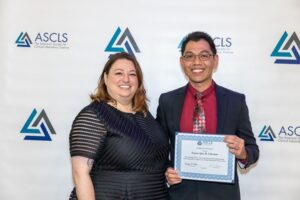Application deadline: February 15
Purpose
The purpose of the ASCLS Scientific Research Award is to recognize and encourage the development of scientific research in the field of medical laboratory science within the past two years. Examples may include, but are not limited to, new test methodology, reagent development, test development, quality assurance, quality control program development, and instrument development. Research projects involving creative innovations and materials belong to the Theriot Award for Development of Significant Materials in Media and Equipment.
Award
Recipients receive a certificate at the ASCLS Annual Meeting Awards Ceremony.
Applications
All entries are submitted via Online Awards Application Form. The deadlines are strictly enforced.
Eligibility
- Any member of ASCLS who has developed scientific materials, or provided the item or idea for the item
- Any organized group that has developed scientific materials or provided the item or idea for the item that is sponsored by an ASCLS member
- All entries must be in a well-developed state, not a preliminary stage of investigation or development
Judging Criteria
1. Time frame
- Was the research described in the proposal conducted in the past two years?
2. Scientific merit
- Benefit to the profession: improve quality of laboratory testing, improve patient care/treatment?
- Originality: original or unique approach or concept?
- Relevance to current laboratory medicine: research timely or critical to laboratory practice?
- Impact on ASCLS Body of Knowledge or Scope of Practice: research expands current level of knowledge or scope of practice in clinical laboratory science?
3. Overall presentation
- General: writing clear, logical with appropriate scientific writing style utilized?
- Title: clear, concise, and accurate portrayal of the project?
- Abstract:
- Broad, long term objectives, specific aims clearly stated?
- Health relatedness of the project clearly stated?
- Methods of achieving goals concisely described?
- Results, conclusions from research concisely stated?
- Introduction: background information adequate?
- Materials and Methods:
- Research procedures used accomplish specific aims of the project?
- Test and control populations appropriate for study?
- Equipment, procedures described so others could repeat study?
- Results: data well organized and presented in appropriate formats (charts, graphs, etc.)?
- Conclusion:
- Data support the thesis?
- Data interpreted clearly?
- Discussion focuses on significance of results?
- Valid conclusions drawn?
- Further studies indicated and noted?
- References: current, adequate, relevant to study?
ASCLS reserves the right to withhold the award for the current year if nominees do not meet requirements.
